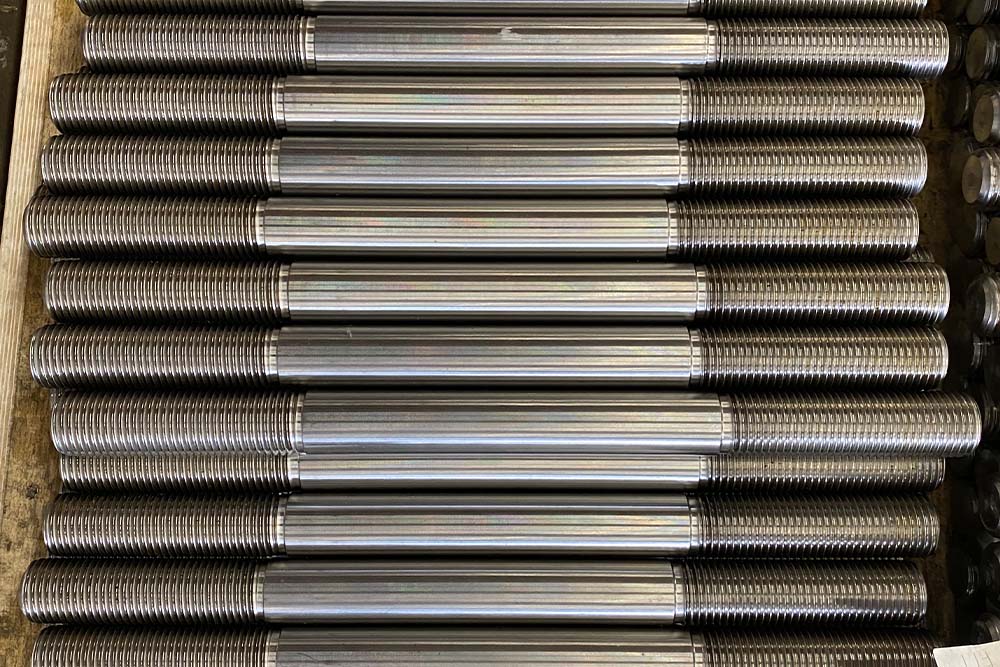All fastener threading is the same, right? Actually, no.
Many different variables impact fastener thread performance. Some factors to consider when purchasing fasteners include:
- Thread pitch (the distance between two thread peaks)
- Thread count (the number of threads per inch)
- Flank angle (the angle between the thread axis and flank)
- Pitch diameter
In addition to these factors, you should also pay close attention to the thread-forming process. Generally, threads are created using one of two standard methods: thread rolling and thread cutting.
Rolled thread is the preferred option for almost all industrial applications. Here’s why.
Thread Rolling: The Basics
Before we compare the different types of thread options, let’s take a closer look at the basic rolling process.
Thread rolling is a cold metal-forming method, meaning the metal is not superheated during rolling.
Thread rolling involves the use of rolling dies, and each die is a mirror image of the desired thread. The die is placed over cylindrical blanks to form screws or bolts. When forming internally threaded fasteners like nuts, it goes inside an opening in the blank.
Rolled threads are formed by reshaping the blank. No metal is removed or cut from the blank during this process, which makes thread rolling unique from cutting or grinding threading methods.
Rolled Thread vs. Cut Thread
Thread cutting involves removing material from a fastener blank to create threads. This process can compromise the integrity of the blank, which, in turn, can negatively impact fastener performance.
On the other hand, rolled threads are made using a die. The die reshapes the blank rather than removing the material. The result is a more robust fastener that exhibits better wear resistance. These fasteners have better yield, tensile, and shear strength.
Benefits of Rolled Thread Fasteners
Fasteners that have gone through the thread rolling process are more advantageous than cut thread fasteners. Here are three reasons why.
1. Improved Quality and Performance
The most significant advantage of rolled threads is superior performance. These types of fasteners outperform cut threads in every meaningful metric.
Rolled threads also have far lower tolerances. In other words, they fit more snugly and have a better finish.
The geometry is more accurate as well. Rolled threads have a better pitch and angle when compared with cut threads, which often suffer because the quality of cut threads can vary greatly, leading to performance inconsistencies.
2. Decreased Cost
Surprisingly, rolled threads are cheaper to produce than cut threads. Why? Thread rolling involves the use of smaller stock.
When cutting threads, blanks must be produced at a diameter larger than the finished fastener. A significant amount of material will be cut away during the formation process.
Since thread rolling reshapes material, it’s possible to use smaller blanks, resulting in less material waste and reduced production costs.
Thread rolling helps reduce costs in other ways, too. For instance, thread-rolling tools are cheaper than cutting or chasing tools. The thread rolling process is also less costly, as no heating is needed to form threads using rolling methods.
3. Stronger Joints
Rolled threads are created as part of a cold-forging process.
Like all cold-working processes, this method boosts tensile strength. It also increases fatigue strength by as much as 75%. Rolled threads have been shown to maintain increased stability even when exposed to extreme heat for prolonged periods.
Increased tensile and fatigue strength results in stronger joints, making this thread selection ideal for strenuous applications, such as heavy construction and infrastructure projects.
Stay in the Know with Dyson Corp.
The difference between rolled thread and cut thread is just one of many nuances you need to know when purchasing construction materials you rely on. Staying informed will help you select the right products for your proejcts. You can use industry knowledge to save money and streamline the purchasing process.
Want to hear more from Dyson Corp. and stay on the cutting edge of significant developments within the industry? If so, then we invite you to sign up for our eNews.
In each email, our team covers important fastener-related topics like forging processes, finishing methods, and more. Contact us today at [email protected] to be added to our list.
